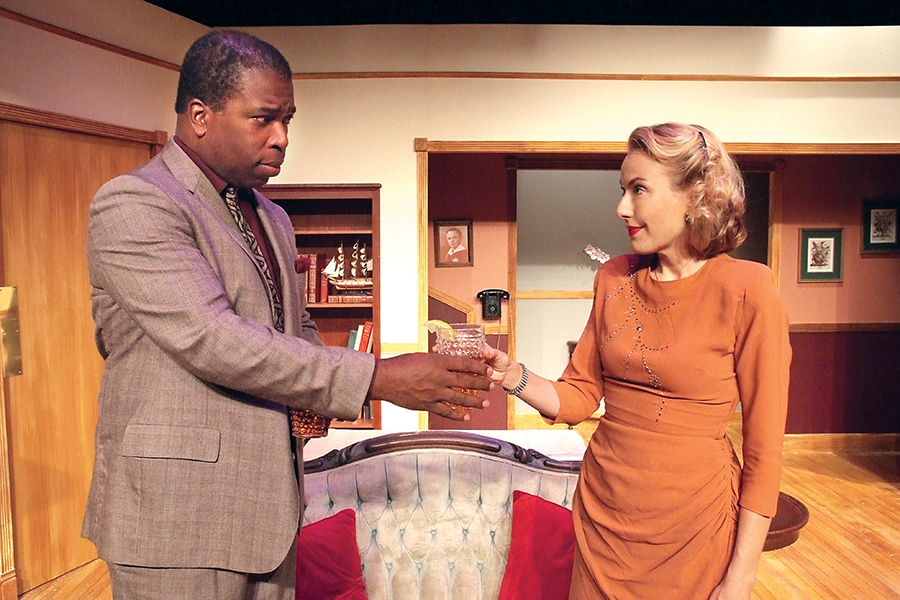By Libby Motika
Palisades News Contributor
The set-up for Laurel Wetzork’s play Blueprint for Paradise couldn’t be more enticing. After all, the thought that a Nazi compound, known as Murphy Ranch, was built practically in our backyards in Pacific Palisades in the late 1930s is astonishing.
Perhaps many readers have seen the remnants of this utopian base for pro-Nazi activities in Rustic Canyon, complete with its own water storage and fuel tanks, bomb shelter, a garden and bunkers. The facts continue to reveal that a four-story, 22-bedroom mansion was also in the works, with plans developed by renowned Los Angeles architect Paul Revere Williams, who was African-American.

Photo: Ed Krieger
Murphy Ranch was meant to serve as a fortified world headquarters after the expected Fascist global conquest. There had been reports from Rustic Canyon neighbors of men patrolling the hills on weekends, dressed in uniforms similar to those of the Silver Shirts, an underground American Fascist organization.
The bombing of Pearl Harbor and America’s declaration of war put an end to the plan. Over the succeeding years, the compound has suffered from neglect and vandalism.
Great stuff for background to dramatic events, and Wetzork does just that. She brings the story into the drawing room, choosing to focus on the fictional couple Herbert and Clara Taylor, who purchased the property and are making plans for the residential addition.
Herbert, a businessman, is imagining an extraordinary business opportunity by negotiating with the Germans, who foresee the day when Hitler vanquishes Europe and moves on to take over the U. S.
Clara, whose inheritance has bankrolled the Murphy Ranch project, believes the compound will serve as a war refugee camp. The plot plays out in such a predictable manner you can almost see the blueprint for the action. Stock characters unabashedly affirm the “sterling” attitudes espoused by some in the 1930s and ‘40s, and with a not- too-subtle reference to a certain presidential candidate in the 2016 race.
Sexism, ethnocentrism and racism, most pointedly pronounced in the belief of eugenics, are hammered into the script. There is the Chinese maid, the Italian valet, the suspicious German visitors, the redneck bigot and Clara and Herbert.
Clara is psychologically crippled by her abusive husband, who thinks of women as lesser human forms. He restricts Clara to the duties that display his social success: decorating the luxurious house, participating in women’s club activities and managing the household—the Chinese maid and the Italian valet. To numb her slow suffocation, she quenches her thirst with afternoon cocktails.
The plot rolls along its predictable rails, which, allows Wetzork to develop the emotional center of the play: the friendship between Clara and architect Paul Williams.
Williams warily navigates the homegrown racism, which remarkably has not burdened his career. He signs on to the Murphy job, having been recommended highly as the best architect in L.A. This endorsement nevertheless is of no consequence to Herbert, who is repulsed by the thought of an African American in his presence, let alone his house.
Notwithstanding this tension, Clara be- gins to relax in Williams’ company and is moved by his wisdom, informed by his own resilience in a lifetime of bigotry. He encourages her curiosity, praises her creative talent and allows her to think about furthering her education, even going to col- lege, heretofore out of the question in her world. His calm, respectful manner proves a salve to Clara’s diminished ego. She is slowly born into a new self.
The scenes between Clara (Meredith Thomas) and Paul Williams (Regi Davis) are authentic, moving and hopeful.
The cast is superbly bolstered by these two and by Peter McGlynn, who plays the German liaison Wolfgang Schreiber with just the right amount of charm and cold- hearted precision.
Blueprint for Paradise continues through Sunday, Sept. 4 at the Hudson Theatre, 6539 Santa Monica Blvd. Contact: (323) 960-4412.












You must be logged in to post a comment.